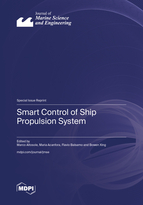Smart Control of Ship Propulsion System
A special issue of Journal of Marine Science and Engineering (ISSN 2077-1312). This special issue belongs to the section "Ocean Engineering".
Deadline for manuscript submissions: closed (30 January 2023) | Viewed by 25412
Special Issue Editors
Interests: marine propulsion systems; ship energy efficiency; offshore vessels; marine simulation
Interests: ship dynamics; wave loads; autonomous vessels
Interests: marine plants automation; hybrid and full electric propulsion systems; marine simulation; marine fuels
Interests: unmanned surface vehicles; ship motion control; path planning
Special Issues, Collections and Topics in MDPI journals
Special Issue Information
Dear Colleagues,
Smart technologies are rapidly spreading in all fields, including the maritime sector. Nowadays, the smart ship concept is a key factor, as the marine industry works to become increasingly digital, greener, and sustainable. Fully electric propulsion, together with the development of innovative hybrid propulsion systems for ships, can represent a way towards the objective. However, the peculiar environment where ships operate demands dedication in the smart control design of increasingly sophisticated propulsion systems, aimed at high efficiency and safety but that also consider weather routing applications.
The main scope of the invited Special Issue is to publish research covering the above subjects and to provide free dissemination of articles for everyone interested in the abovementioned topics. The rapid turn-around time regarding reviewing and publishing ensures the up-to-date availability of papers for research, teaching, and reference purposes.
High-quality papers are encouraged for publication, directly related to the various topics listed below.
Novel numerical techniques in the ship propulsion control design are encouraged too.
- Smart control of ship propulsion systems;
- Ship propulsion control issues;
- Simulation-based design of marine power systems;
- Propeller and engine modelling for control purposes;
- Adaptive controls to environmental conditions and whole plant demand;
- Marine hybrid propulsion systems;
- Dynamic positioning;
- Guidance and control of autonomous vessels;
- Ship control in weather routing applications;
- System vulnerability early detection.
Prof. Dr. Marco Altosole
Dr. Maria Acanfora
Dr. Flavio Balsamo
Dr. Bowen Xing
Guest Editors
Manuscript Submission Information
Manuscripts should be submitted online at www.mdpi.com by registering and logging in to this website. Once you are registered, click here to go to the submission form. Manuscripts can be submitted until the deadline. All submissions that pass pre-check are peer-reviewed. Accepted papers will be published continuously in the journal (as soon as accepted) and will be listed together on the special issue website. Research articles, review articles as well as short communications are invited. For planned papers, a title and short abstract (about 100 words) can be sent to the Editorial Office for announcement on this website.
Submitted manuscripts should not have been published previously, nor be under consideration for publication elsewhere (except conference proceedings papers). All manuscripts are thoroughly refereed through a single-blind peer-review process. A guide for authors and other relevant information for submission of manuscripts is available on the Instructions for Authors page. Journal of Marine Science and Engineering is an international peer-reviewed open access monthly journal published by MDPI.
Please visit the Instructions for Authors page before submitting a manuscript. The Article Processing Charge (APC) for publication in this open access journal is 2600 CHF (Swiss Francs). Submitted papers should be well formatted and use good English. Authors may use MDPI's English editing service prior to publication or during author revisions.
Keywords
- Automation
- Autonomous guidance
- Green propulsion technologies
- Marine engine
- Safety and efficiency
- Ship propulsion dynamics
- Simulation
- Smart control
- Optimization
- Weather routing









